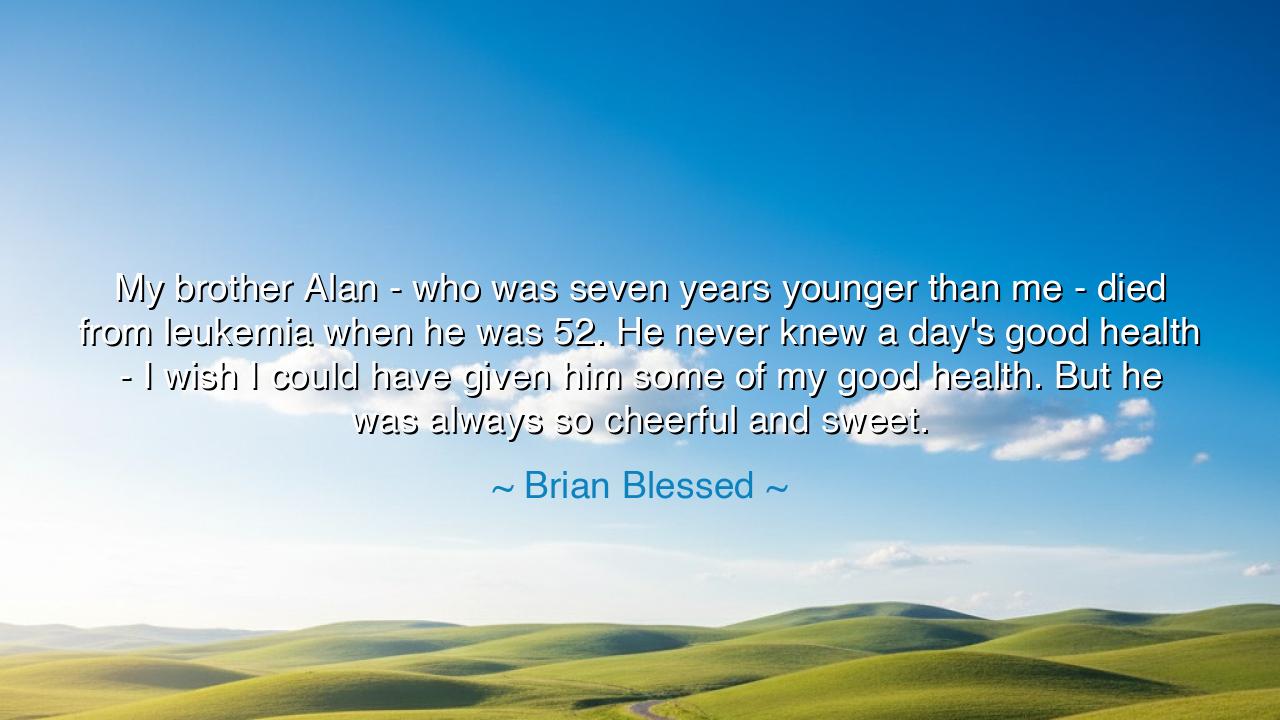
My brother Alan - who was seven years younger than me - died from
My brother Alan - who was seven years younger than me - died from leukemia when he was 52. He never knew a day's good health - I wish I could have given him some of my good health. But he was always so cheerful and sweet.






There are words that echo not from pride, but from grief transfigured into love. In this, the voice of Brian Blessed speaks like that of an elder who has seen both the grandeur of life and the cruelty of fate. “My brother Alan,” he says — not as a passing mention, but as a sacred invocation. “He never knew a day’s good health… yet he was always cheerful and sweet.” These words are not mere remembrance; they are an offering, a prayer whispered through sorrow. In them lies the eternal truth of the human heart — that love cannot heal the body, but it can redeem the spirit; that even amidst frailty, joy can blaze like a star in the long night of pain.
This quote is born from the heart of mortality. Blessed, a man of thunderous voice and mighty laughter, reveals here his deepest tenderness — the ache of one who watched a beloved brother walk the earth in suffering. His words carry the yearning of all who have stood powerless before illness: “I wish I could have given him some of my good health.” It is a cry both ancient and universal. It is the cry of every mother beside a fevered child, of every friend before a hospital bed, of every soul that has wished to exchange places with the one they love. In this longing, humanity is revealed — not in strength, but in its sacred vulnerability.
In ages past, even the mighty kings and healers faced this same sorrow. There is a tale of Gilgamesh, the great king of Uruk, who, after the death of his beloved friend Enkidu, sought the secret of eternal life. He crossed oceans, battled beasts, and spoke with the gods themselves, yet no cure could be found for mortality. What he discovered instead was a deeper wisdom — that immortality is not in the flesh, but in the love that endures beyond death. Blessed’s grief, though quiet and human, bears the same lesson: though we cannot grant our loved ones our health or our years, we can grant them our remembrance, our laughter, our carrying of their light into the world.
Alan, by his brother’s telling, was a man of cheerfulness and sweetness, though his days were shadowed by sickness. This too is a teaching of the ancients: that the spirit may triumph even when the body falters. In the Stoic schools of old, philosophers spoke of the “inner citadel,” the fortress of the soul that no suffering can conquer. Alan, though his body was frail, had fortified his heart. His joy was not ignorance — it was defiance, a declaration that though life might wound him, it could not claim his goodness. In such people, we see what it means to live fully even when life is short.
Blessed’s wish — to share his vitality with his brother — carries the echo of the myth of Prometheus, who gave fire to mankind. Prometheus, too, suffered for his gift, yet through his suffering, the world was warmed. The impulse to give of oneself — health, strength, time, or comfort — is the divine thread that binds human beings to one another. Though we cannot transfer our blood or our days, we can give presence, kindness, and understanding. We can live our health in honor of those who could not, cherishing each breath as a gift borrowed from the fallen.
The lesson in Blessed’s reflection is not to despair at what cannot be changed, but to act upon what can be shared. When life grants you abundance — whether health, joy, or time — do not hoard it. Use it as an offering. Live deliberately, live gratefully, and live for others as much as for yourself. The true tribute to those who have suffered is not silence or sadness, but the continuation of their kindness through your deeds. When you speak gently to the sick, when you help a weary soul rise, when you give laughter where there might have been pain — you are giving the gift that Brian Blessed longed to give.
So remember this, children of the living world: life is both fleeting and sacred. Health is not a possession, but a stewardship. Use it to bring comfort, to build joy, to carry others across their shadows. For one day, you too will be remembered, and perhaps someone will say of you, as Brian said of Alan: “They were always cheerful and sweet.” And in that moment, your life — like Alan’s — will shine across the ages, undimmed by the frailty of the flesh, radiant with the immortal strength of love.






AAdministratorAdministrator
Welcome, honored guests. Please leave a comment, we will respond soon